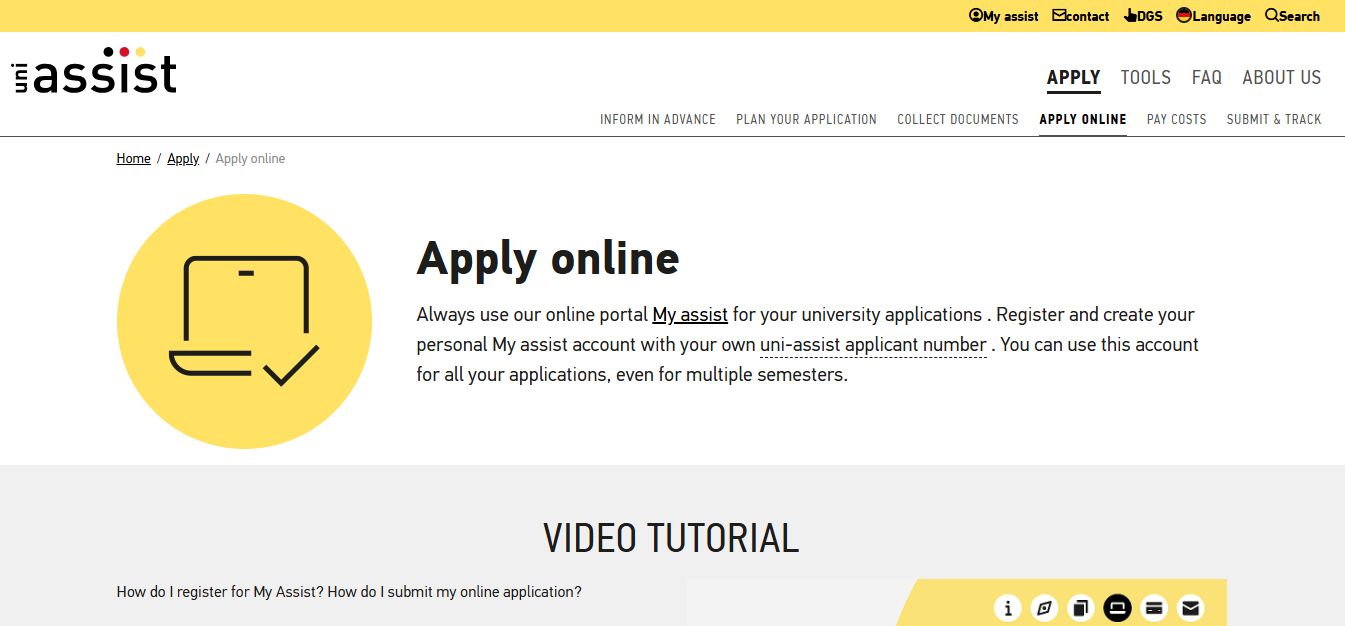Applying to public universities in Germany is one of the most important steps for international students planning to study in Europe. With a reputation for academic excellence, low or no tuition fees, and a rich blend of tradition and innovation, Germany has become a top destination for students worldwide.
This guide walks you through exactly when and how to apply to public universities in Germany. You’ll learn about application timelines, required documents, accepted tests, and key deadlines all in one place.
Timing is everything. The German application process is well-structured but driven by strict deadlines. Missing key dates or failing to prepare your documents on time could cost you a semester or delay your visa and accommodation.
That’s why we’ve created this comprehensive timeline and application guide. Here’s what you’ll find:
- The differences between Summer and Winter intakes
- Exact application windows and deadlines
- What documents you need and when to prepare them
- Which language tests are accepted (and which aren’t)
- Helpful tips for organizing your application and avoiding common mistakes
Let’s map out your study journey to Germany step by step so nothing stands in your way.
Germany’s Two Main Intakes: Winter vs. Summer
Unlike countries such as Canada or the U.S. that offer three intakes a year, Germany follows a strict two-semester system. Understanding the differences between the Winter and Summer intakes is essential for planning your application strategy effectively.
Whether you’re applying for Winter or Summer semester, knowing when and how to apply to public universities in Germany will keep you on track with each step.

| Intake | Classes Start | Ideal Time to Apply | Deadline (varies) | Best For |
| Winter | October | March – May (varies) | March – July | Most popular, more courses |
| Summer | April | September – November (varies) | September – January | Less crowded, limited programs |
1. Winter Intake (Starts in October)
The Winter semester is the main intake for public universities in Germany, offering the most seats and a broader range of programs.
Key Features:
- Most programs are available only in Winter
- Higher availability of scholarships and course options
- Suitable for both Bachelor’s and Master’s applicants
- Better admission chances if you apply early
Ideal Application Timeline:
- Start Applying: February/March
- Earliest Deadline: March
- Absolute Cut-off: Varies by university, but often in mid-July
Pro Tip: Applying in March or later can put you at a disadvantage. Many visa slots may already be booked, and admission decisions could be delayed, impacting your entire study plan.
2. Summer Intake (Starts in April)
Though smaller in scale, the Summer intake is a valuable alternative if you miss the Winter round or prefer to start earlier.
Key Features:
- Fewer universities and programs participate
- More common for Master’s-level programs and specific fields
- Less competition among applicants
- Easier access to campus housing in some cities
Ideal Application Timeline:
- Start Applying: August/September
- Earliest Deadline: September
- Final Deadlines: Mid-January
Pro Tip: Start preparing your documents in July or August to meet the earliest deadlines without stress.
Timeline Breakdown: From Application to Arrival
Let’s walk through a month-by-month timeline for both intakes:
1. Winter Intake
| Month | What to do |
| February – March | You should begin applying to your target universities either via the Uni-Assist portal or through direct applications, depending on the institution or direct portals. |
| March – July | This is your final chance to submit applications, if still open, and gather any remaining documents required for processing. |
| July – August | You will begin receiving offer letters; during this time, also open your blocked account, begin visa preparations, and book your visa appointment. |
| September | Use this month for final travel preparations: arrange accommodation, get health insurance, and start packing your essentials. |
| October | This is when you arrive in Germany, register locally, and begin your university classes. |
2. Summer Intake
| Month | What to do |
| August – September | Begin your applications for the Summer (April) intake. Some universities may open their portals as early as July. |
| September – January | Application deadlines typically close during this time, so make sure all materials are submitted before the cutoff. |
| February – March | You will receive admission offers; begin your student visa process and prepare for international travel. |
| April | You will officially begin your studies at a German public university. |
Understanding when and how to apply to public universities in Germany helps avoid last-minute stress and missed opportunities
What Documents Do You Need?

Here’s a checklist you can’t skip:
- Academic Transcripts
- Degree Certificate
- IELTS (6.5+) or TOEFL
- Europass CV
- Letter of Motivation
- Letters of Recommendation (if required)
- Passport (valid for 12+ months)
- School-Leaving Certificates
- Work Experience Letters (if required)
How to Apply to German Public Universities
Applying to German public universities can seem overwhelming at first, but once you know your options, the process becomes much more manageable. There are three main routes you can take depending on your confidence level, time availability, and the number of universities you’re targeting.
Option 1: Apply Through Uni-Assist
Uni-Assist is Germany’s centralized application portal used by over 180 public universities to check international student applications.

Why Choose Uni-Assist?
- Apply to multiple universities from a single portal
- Ensures document quality checks to prevent rejection
- Increases your chances of success through a streamlined process
Cost Structure:
- €75 for your first university application
- €30 for each additional university
Apply via Uni-Assist
Option 2: Direct Application to Universities
Some top-tier universities, especially those with unique processes or stricter academic requirements allow direct applications through their own online portals.
Examples of Universities with Direct Applications:
- Technical University of Munich (TUM)
- Ludwig Maximilian University of Munich (LMU)
- University of Stuttgart
- RWTH Aachen University
Pro Tip: Always verify requirements and deadlines on each university’s official website. Every institution has its own rules.

Option 3: Apply by Post or Direct Email
A few universities still allow applications via email or postal mail, especially for specific intakes or program types.
When to consider this route:
- If the university’s portal is down or under maintenance
- If you’re applying for non-restricted degree programs or under special cases
- When the university explicitly mentions “postal/email submission” on their official page
Make sure to attach scanned copies of certified documents in the right forma and follow all instructions carefully (e.g., subject line, file naming, language of documents)
Pro Tip: Whether you’re applying via Uni-Assist or directly to a university, having a trusted guide can make the difference between stress and success.
Why Applying Early is Critical
In Germany’s admission system, applying early can significantly impact your chances of getting in, securing housing, and obtaining your visa on time.
Top Reasons to Apply Early
1. Admission Slots Fill Quickly
German public universities don’t hold spots open. Once the seats are filled, applications are closed, even if you meet all the requirements.
2. Visa Appointments Are Limited
German embassies and consulates in many countries are often booked for months in advance. Delaying your admission letter directly delays your ability to book a visa appointment.
3. Document Processing Takes Time
Transcripts, IELTS/TOEFL scores, notarized translations, and certified copies can take several weeks, especially if you’re waiting on your university or government agencies.
4. Student Housing Is Competitive
University dorms in major cities like Berlin, Munich, and Frankfurt are in high demand. Late applicants often end up in expensive or inconvenient private housing.
Understanding exactly when to apply public universities Germany ensures you don’t miss deadlines or face visa delays.
Early Planning = Less Stress, More Options. Submitting your application in January – February for Winter or August for Summer gives you a significant edge over the majority of students who apply at the last minute.
What Happens After You Submit Your Application
Once your application is submitted, universities typically take 4 to 8 weeks to process it. During this time:
- You may receive updates or requests for additional documents via email or the portal (like Uni-Assist)
- Some universities conduct interviews or assessments for selected programs
- Make sure to regularly check your email and application portal for any updates
If accepted, you’ll receive an official admission letter (Zulassungsbescheid), which is essential for your visa application, finding housing, and preparing for your move.

FAQs:
Can I apply to multiple universities at once?
Yes. Through Uni-Assist or directly, you can apply to as many as you like — just track the deadlines.
Do I need German language skills?
For English-taught programs, no. But learning A1/A2 German helps in daily life and visa appointments.
What if I don’t have my degree yet?
You can apply with provisional documents, but final degrees are required before enrollment.
How much time does a visa take?
Usually 6–12 weeks. Book early and prepare all docs.
Is a blocked account mandatory?
Yes, it’s proof of financial means. Without it, your visa will be rejected.
Are private consultancies helpful?
They can speed up things, especially for students confused about paperwork. But you can self-apply too.
Not Sure Where to Start? Let Us Guide You
Applying to German public universities can be confusing. With options like Uni Assist, direct applications, and postal submissions, it is easy to feel overwhelmed by the different rules and deadlines.
AccessFuture is here to simplify the process.
✅ Get a Free Profile Evaluation
🎯 Find universities that match your background, goals, and timeline
📄 Receive expert support with documents, motivation letters, and more
✈️ From choosing the right application method to preparing your visa, we will support you every step of the way
👉 Start your journey to Germany with clarity and confidence. Talk to an expert today











